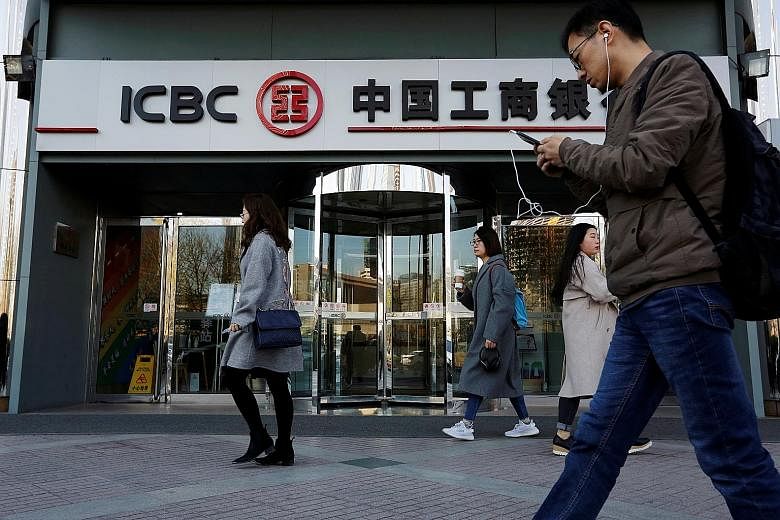SHANGHAI • Stock investors have never been so downbeat on the world's biggest banks.
China's "big four" state-owned lenders, which together control more than US$14 trillion (S$19 trillion) of assets, tumbled to record-low valuations yesterday amid mounting concern that Beijing will encourage them to bail out smaller peers.
Industrial and Commercial Bank of China (ICBC), the world's largest lender by assets, lost US$11 billion of market value last week after injecting capital into a troubled regional bank as part of a government-orchestrated rescue.
Big Chinese lenders have long sacrificed profits in the name of national service, but that prospect has become increasingly worrying as pressure builds on their regional, city and rural peers.
Smaller Chinese banks tracked by UBS Group need an estimated US$349 billion of fresh capital - a sum they may struggle to raise without support from the likes of ICBC.
For shareholders already skittish about the US-China trade war, rising corporate defaults and slowing economic growth, it is yet another reason to sell.
"State-owned commercial banks are clearly suffering from the market impression that they will need to swallow other smaller and weaker banks, at least partially," said Ms Alicia Garcia Herrero, chief economist for Asia-Pacific at Natixis in Hong Kong.
ICBC declined to comment. The China Banking and Insurance Regulatory Commission and press officers at the country's other mega-banks - China Construction Bank, Bank of China and Agricultural Bank of China - did not respond to requests for comment.
-
US$11b
-
Market value that Industrial and Commercial Bank of China, the world's largest lender by assets, lost last week after injecting capital into a troubled regional bank as part of a government-orchestrated rescue.
While the four banks have dominated China's US$40 trillion banking system for decades, they have been joined in recent years by a growing number of smaller banks, many of which funded themselves with opaque asset management products and interbank borrowing, instead of more stable consumer deposits. These smaller banks are now getting squeezed as regulators clamp down on risky funding methods and China's economic slowdown causes bad loans to increase.
Their plight has been a major focus of investors since May, when Beijing surprised markets by seizing control of Baoshang Bank in the first government takeover of a Chinese lender in two decades. That was followed two months later by a capital injection into Bank of Jinzhou by ICBC and two other state-owned financial firms.
Analysts predict that more of China's roughly 4,000 small lenders will run into trouble and that bigger banks will be asked to play a role in shoring them up.
While regulators could in theory allow distressed lenders to fail, that outcome is seen as unlikely because of Beijing's focus on maintaining financial stability. When the authorities imposed losses on a small number of Baoshang Bank's creditors, it triggered a mini-panic in interbank funding markets that subsided only after big cash injections from the central bank.
"The smaller banks, as they require the fire hose, will likely get rolled up into the bigger banks, where they can disappear," said Associate Professor Christopher Balding of Fulbright University Vietnam, who has written extensively on the Chinese economy and financial system.
Investors have responded by pummelling Hong Kong-listed shares of the big four banks, sending prices to record lows relative to book value, or net assets. The stocks traded yesterday at an average price-to-book ratio of 0.61, falling below a previous nadir reached in February 2016.
For investors with longer time horizons, it might be a good time to buy, said Mr Terry Sun, a Hong Kong-based analyst at CMB International Securities.
The Chinese authorities are unlikely to force big banks to take on more than they can handle, according to Mr James Stent, author of China's Banking Transformation.
"Even if you take some pretty severe assumptions on how many banks need to be taken over, you will likely find it's scarcely a ripple on the profits and balance sheets of the big banks," he said.
The big four banks reported combined profits of US$140 billion last year, according to Bloomberg data.
Ms Katherine Lei, a Hong Kong-based analyst at JPMorgan Chase & Co, is less sanguine. In a July 29 report, she said she was taking a more cautious view on Chinese bank shares, citing the overhang of troubled smaller lenders and rising corporate default risks and increased government pressure to give borrowers favourable interest rates to support economic growth.
BLOOMBERG

